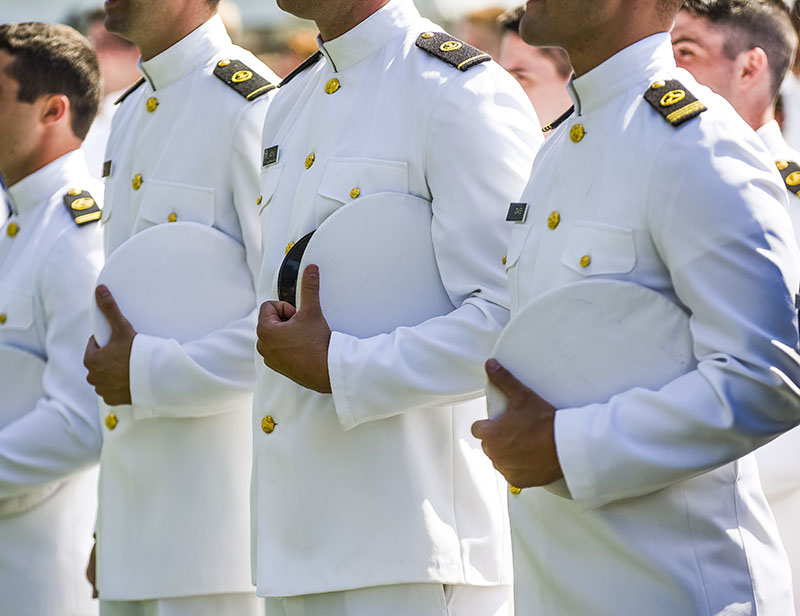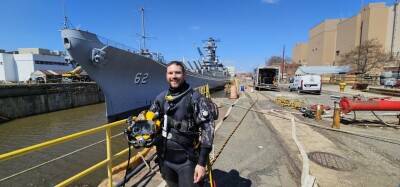The U.S. Merchant Marine Academy will resume its Sea Year training for midshipmen on commercial vessels, amid a new plan to deal with sexual harassment both at sea and at the Kings Point, N.Y., campus
In a Jan. 6 letter to Rear Adm. James Helis, the USMMA superintendent, U.S. Transportation Secretary Anthony Foxx said the Maritime Administration will “continue efforts with the shipping industry to address the climate at sea and the treatment of midshipmen during their Sea Year training.”
“You have a clear way ahead for that,” Helis told midshipmen at an all-hands meeting at the academy Friday.
The latest report on campus issues is “fairly hard-hitting, it pulls no punches,” Helis said. “We have problems. We have a lot of strengths here at the institution and this report points that out.”
Foxx cancelled Sea Year in June 2016, amid mounting concerns over complaints of harassment reported by some midshipmen. High-level meetings between Marad and shipping executives ensued.
Now Marad has a highly detailed plan to address the issue on shore at Kings Point. In his letter Foxx states, “while the academy's culture is grounded in a sense of service, discipline and teamwork, our young people arc at a greater risk or sexual assault and harassment than they should be and that there are things we can do now and over the longer term to put a stop to it.”
Both plans to address issues of harassment during Sea Year and on campus rely on findings in reports from Logistics Management Institute, a defense consulting firm engaged by DOT.
“Working with the MARAD Shipboard Climate Compliance Team (SCCT), you are authorized to resume Sea Year training on commercial vessels in a phased, company-by-company manner, provided that MARAD and the Academy have determined that a company has complied with the credentialing criteria established by the SCCT, as recommended in the LMI report,” Foxx wrote in the letter.
The pending reinstatement comes alongside a new plan to deal with issues at the academy itself. In a “cultural audit” of USMMA, the firm reports, “we found an ‘us versus them’ mindset shaping academy culture across various dimensions, including male versus female midshipmen; midshipmen versus the leadership, staff, and faculty; and uniformed versus civilian faculty.”
“The academy is also marked by a sense of victimhood, with some staff and faculty members and midshipmen feeling that they are treated unfairly and are unable to improve the situation,” the report says. It offers three broad steps to take:
“Build and align academy leadership and management team across all levels of the institution.
“Develop and implement a comprehensive, multiyear Sexual Assault and Sexual Harassment Prevention and Response Strategic Campaign Plan.
“Develop a Sea Year credentialing program that will enable the academy and industry to maximize program effectiveness while maintaining the health and safety of the midshipmen.”
The report portrays USMMA as a “fragmented” institution under pressure.
“Fear, in multiple forms, also plays a strong role in shaping attitudes and behaviors at the Academy,” the report states, “fear for the future of the academy and the maritime industry in general; fear of being “blacklisted” by industry or jeopardizing chances of graduation; and fear of retaliation, ostracism, and bullying.
During confirmation hearings in Washington, D.C., DOT secretary nominee Elaine Chao told members of Congress that addressing the issues at USMMA would be an early priority for her as the Trump administration takes over.
The suspension of Sea Year was protested by midshipmen, parents, alumni and other stakeholders, with some challenging the conclusions of surveys and studies showing sexual harassment at USMMA is worse than at other service academies.
At Friday’s meeting, superintendent Helis said the time is past for arguing those points, and warned against expecting a course reversal under a new administration. “For anyone who thinks that this is going to go away anytime soon, you’re delusional.”
“There’s no time here to debate the margins of error … we have problems. The time to argue about whether we have problems or not is over,” Helis said. “As long as there’s something above zero, we’ve got a problem.”





